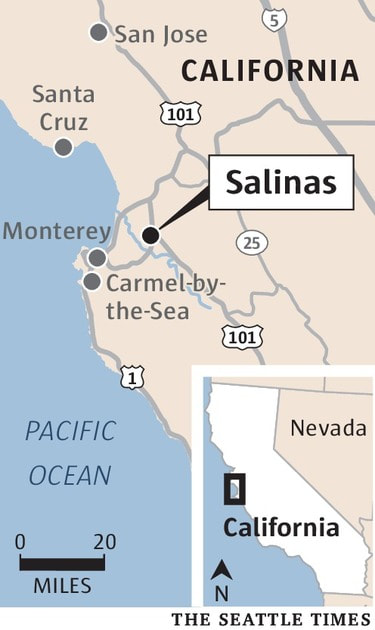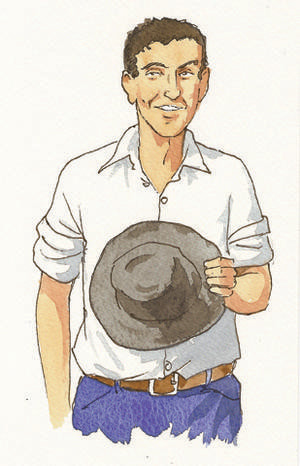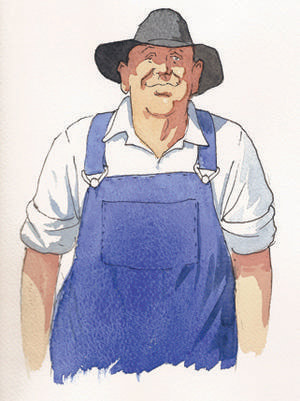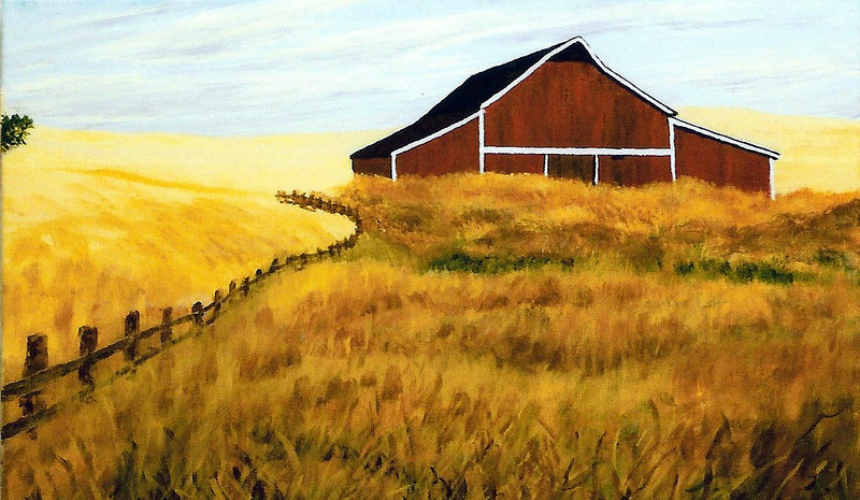Contenu reservé aux membres | Member Only ContentConnectez-vous pour lire la suite | Sign in to read more
|
If you are already logged in, please scroll down. | Si vous êtes déjà connecté, veuillez descendre.
|
|
|
A | General comprehension
The setting
|
The novel opens in the Salinas River, a few miles south of Soledad, in California. "Soledad" is a Spanish word for "loneliness" or "solitude," a reference to one of the novel's central themes: "Guys like us, that work on ranches, are the loneliest guys in the world. They got no family. They don't belong no place". Almost every character of Of Mice and Men is lonely or separated from the others somehow.
In the opening lines, the peaceful scene by the river symbolically represents freedom. There is a strong emphasis on the natural world. Steinbeck is a master of description, especially the description of the Californian landscape. It is worth mentioning that John Steinbeck spent the first 18 years of his life in the Salinas Valley. The setting in this novel is natural, quiet and peaceful. This is highly significant in contrast to the trouble George and Lennie have left behind in Weed, and to the hard-working days ahead. |
Why did George and Lennie have to leave Weed?
Both men had to hurriedly leave the last ranch where they worked, following an incident involving Lennie. We are not told a lot about it; we just know that Lennie touched a girl's dress. "Jus' wanted to feel that girl's dress – Jus' wanted to pet it like it was a mouse – Well, how the hell did she know you jus' wanted to feel her dress? She jerks back, and you hold on like it was a mouse. She yells, and we got to hide (…)" (page 17). Lennie is obsessed with stroking soft things such as animal fur and wants to touch everything he sees. The girl in Weed did not understand that he only wanted to feel the soft fabric of her dress, and she instead thought he was going to assault her. Lennie appears to lack awareness of social convention.
Where are they going?
They are heading to a nearby ranch where they expect to sign on for temporary work.
What do they plan to do when they have enough money?
They plan to purchase their dream ranch and keep rabbits. Lennie asks George to tell him over and over again about that dream ranch, where his main task will be to tend and raise rabbits. George and Lennie embody the American Dream of migrant labourers – the dream to own their own piece of land and have a chance to settle down in the “Garden of Eden” which California represented.
B | Detailed comprehension and analysis
In what ways do George and Lennie differ in their appearance?
George
Lennie
Analysis
The two main characters are introduced first by their description and then by their names. Their physical portrayal emphasizes both their similarities and their individuality.
They both wear similar outfits and carry blanket rolls, but they are more dissimilar than they are alike. Lennie is, in fact, the antithesis of George in every way.
When George is introduced, there is a strong emphasis on his quickness. The words “quick”, “restless” and “sharp” are physical reflection of George’s intelligence and nimbleness. The language used here with words such as quick, restless and sharp can be seen as a physical reflection of George’s intelligence and quick thinking. This provides a strong contrast with Lennie, who is large and slow.
Lennie’s enormous size is indeed the focus of his introduction. His physical vastness is clearly emphasised in the opening pages. He is portrayed as a huge and bulky-bodied man who finds it difficult to control his strength. Lennie’s surname is Small, which is quite ironic since Lennie is an imposing character. However, his surname is representative of his intellect (he is intellectually limited and slow).
The two main characters are introduced first by their description and then by their names. Their physical portrayal emphasizes both their similarities and their individuality.
They both wear similar outfits and carry blanket rolls, but they are more dissimilar than they are alike. Lennie is, in fact, the antithesis of George in every way.
When George is introduced, there is a strong emphasis on his quickness. The words “quick”, “restless” and “sharp” are physical reflection of George’s intelligence and nimbleness. The language used here with words such as quick, restless and sharp can be seen as a physical reflection of George’s intelligence and quick thinking. This provides a strong contrast with Lennie, who is large and slow.
Lennie’s enormous size is indeed the focus of his introduction. His physical vastness is clearly emphasised in the opening pages. He is portrayed as a huge and bulky-bodied man who finds it difficult to control his strength. Lennie’s surname is Small, which is quite ironic since Lennie is an imposing character. However, his surname is representative of his intellect (he is intellectually limited and slow).
What two animals does Steinbeck compare Lennie with in this scene?
John Steinbeck uses animal imagery (both similes and metaphors) to describe Lennie. The man is compared to both a bear and a horse: “(…) he walked heavily, dragging his feet a little the way a bear drags its paws (…) and drank with long gulps, snorting into the water like a horse”. (page 7). This is a way for Steinbeck to put the emphasis on Lennie’s size and mental impairment, but also to make him more sympathetic at times.
Why are rabbits mentioned at the start of the novel?
|
As the novel opens, rabbits are mentioned several times in the description of the landscape: ‘On the sand banks the rabbits sat as quietly as little gray, sculptured stones”. (…) “The rabbits hurried noiselessly for cover”. Rabbits add to the rural, agricultural setting of the novel but they are also a feature of George and Lennie’s dream to own a ranch and “live off the fat of the land”.
|
Rabbits are the focus of Lennie’s American dream. They represent comfort, freedom and belonging. They can be seen as an omen. This obsessions with rabbits is another example of Lennie’s simple and childlike thinking: “(…) An’ have rabbits. Go on George! Tell about what we’re gonna have in the garden and about the rabbits in the cages (…)”
‘Tell me about the rabbits, George’
Today, the phrase is used in English when you refer to something that you know will never happen.
Definition : A popular quote from John Steinbeck's Of Mice and Men (said by Lennie to George), sometimes used when dreaming of something (often along with someone else) that you know will never happen. Usually used in a sad, almost-reminiscent way.
Today, the phrase is used in English when you refer to something that you know will never happen.
Definition : A popular quote from John Steinbeck's Of Mice and Men (said by Lennie to George), sometimes used when dreaming of something (often along with someone else) that you know will never happen. Usually used in a sad, almost-reminiscent way.






